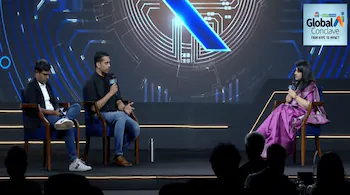Zerodha’s Chief Technology Officer (CTO), Kailash Nadh, made a candid confession about his dependency on artificial intelligence (AI) tools, revealing how deeply integrated large language models (LLMs) have become in his workflow.
“I can’t write code without LLMs anymore,” Nadh candidly admitted. “It’s gotten to that point.”
Nadh elaborated on the profound impact these AI models have had on his productivity. “LLMs have become like a second brain for developers,” he said, during a chat at the Moneycontrol Global AI Conclave in Bengaluru. “I’ve been coding for over 25 years, and nothing has ever come close to the kind of productivity boost and creativity these tools enable. I’m even learning a new programming language in a way that was unimaginable before.”
Describing how LLMs are used at Zerodha, Nadh highlighted their role in simplifying code generation and debugging.
“We (Zerodha) use it heavily for code generation—not massive amounts, but for topical, focused tasks. Debugging with LLMs has been a game-changer, saving us hours of effort.” However, he clarified that Zerodha has not deployed generative AI models in customer-facing products.
“Internally, though, from an organisational efficiency perspective, we’ve made massive strides using simple workflows built from open-source models.”
One of the standout examples Nadh shared was the transformation of Zerodha’s quality assurance process for customer support. “We have a team of close to 100 people whose job has been to listen to hundreds of thousands of recorded customer calls over the past seven years,” he said. “It’s a soul-sucking job—calls ranging from two minutes to 50 minutes, manually sampled and reviewed to ensure quality.”
Using an open-source speech-to-text model like Whisper, Zerodha built an entirely automated pipeline hosted on its own infrastructure.
“Now, recorded calls are transcribed into high-quality text locally. The system uses LLMs to analyse these transcriptions, breaking them down by speaker and annotating key moments. The LLM identifies calls where quality parameters seem off, so our team only needs to review specific flagged calls rather than randomly sampling. Their job has shifted from manual drudgery to truly focusing on quality assurance,” Nadh explained.
“That’s just one example of how AI has improved organisational efficiency.”
While Nadh praised the benefits of AI tools, he also acknowledged concerns about their impact on jobs. “It’s a valid concern, but our philosophy has always been to use AI as an amplifier, not a replacer. It’s about augmenting what humans can do, not taking their place.”
A piece of technology won’t replace you overnight: Zerodha CTO on AI Policy and job security
PhonePe’s conservative approach to AI adoption
In contrast to Zerodha’s enthusiastic embrace of generative AI, PhonePe’s CTO Rahul Chari articulated a more cautious strategy. “I’ve been generally cautious about the use of Gen AI at PhonePe as a whole, so I haven’t really leaned in fully on trying to leverage it across the board,” Chari said. “It’s been much more of a learning exercise.”
Chari emphasised the challenges of integrating AI into critical systems. “For our high-scale, distributed systems, generative AI is a big no-no. The stakes are too high. Reliability and predictability in our code are paramount, and AI-generated code introduces risks we’re not willing to take,” he explained.
Instead, PhonePe is using AI in non-core operations like customer support and sentiment analysis. Chari highlighted examples such as automating workflows and analysing unstructured data. “We are exploring use cases on the periphery of our core operations. For instance, in health insurance, there’s often a lot of fine print in policies. We’re experimenting with domain-specific models that allow users to have conversational interactions to understand policies better,” he said.
In areas like content creation, PhonePe has seen notable benefits. Chari pointed to applications such as generating campaign material and producing trading content for its stock broking platform ShareMarket. “We had automation for campaigns even before Gen AI, but the quality and capability have improved significantly,” he noted.
Despite these advancements, Chari admitted that PhonePe’s overall reliance on generative AI remains limited. “We’re approaching it carefully because, for us, the margin of error is close to zero,” he said. PhonePe is particularly mindful of regulatory compliance and data protection when experimenting with AI. “It’s moved pretty fast in terms of model capabilities, but ensuring that data is protected and aligned with regulations has held us back from broader adoption,” Chari added.
While PhonePe is progressing cautiously, Chari acknowledged the potential of AI to transform operations when applied thoughtfully. “AI is not a magic bullet for every problem. It’s essential to ensure we’re applying it in the right areas, where the risks are minimal and the rewards are tangible,” he concluded.
The divergent approaches of Zerodha and PhonePe highlight the varying levels of trust in AI technologies within India’s tech ecosystem. For Nadh, the benefits of LLMs far outweigh the risks. “The speed, precision, and creativity that LLMs bring to the table are game-changers,” he said. “It’s not just a tool; it’s a collaborator.”
Chari, on the other hand, maintained that caution is key. “We’re excited about what AI can do, but we’re not jumping in blindly,” he concluded.

